April is Earth Month, and it is a great time to promote sustainable best practices on George Mason University campuses and off. We have some tips on ways the Mason Nation can make a difference in small ways.
1. Reduce your water use.
See if you can cut down on the amount of running water you use while washing your hands, brushing your teeth, or rinsing off dishes. Reduce the length of your showers.
Mason business major Vidhi Pathak recommends making a playlist for the shower. “When showering, I make a two-song shower playlist and finish up after the second song ends,” said Pathak, the undersecretary of sustainability for Student Government.
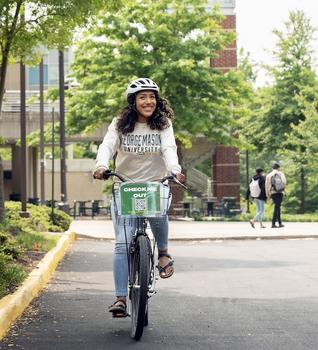
2. Make an effort to walk, bike, or scooter more, especially if you are traveling on or near campus.
These choices can help Mason decrease its carbon emissions and minimize traffic on campus. The new bikeshare stations make it easy to grab a bike. Also consider using the Mason Shuttles or carpooling with friends.
3. Always turn off any lights, appliances, and devices when not in use.
4. Carry a water bottle and use the campus filling stations.
Bringing your own bottle reduces the need to purchase plastic water bottles. The on-campus filling stations even have a meter so you can see how many plastic bottles you helped keep out of landfills. Find the closest water bottle refill station.
5. Take out the trash—correctly.
Always follow the signs on waste receptacles to ensure proper disposal and recycle what you can. There are even composting options available on campus at the Big Belly stations, Innovation Food Forest near Innovation Hall, or Potomac Heights Garden. You can dispose of clean glass bottles and jars at one of the new glass recycling trailers on the Fairfax Campus.
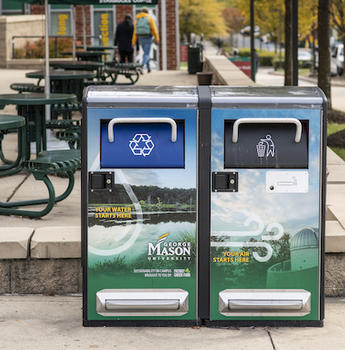
The university has a Zero Waste goal of diverting 90% (or more) of all waste items away from the trash through reuse, recycling, and composting. Get the specifics.
6. Donate unwanted or unneeded items.
Patriot Packout, Mason's annual sustainable move-out initiative, is happening right now through May 10. As students move out of their residence halls, donations of like-new and gently used items are collected at the Fairfax Campus, SciTech Campus, and the Smithsonian-Mason School of Conservation.
This year, donated items will support Mason programs including the Patriot Pantry, Trans Clothing Closet, Art Supply Sharing Closet, First Gen+ Center, and Parking and Transportation's bike programs. Community organizations, such as Food for Others, will also receive donated items.
Visit the webpage for a list of accepted items, campus donation locations, and volunteer opportunities. Mason students who live off-campus and Mason employees are invited to bring any of the accepted items to the 24/7 outdoor drop-off locations.
7. When shopping or running errands, bring a reusable bag, backpack, or other sustainable containers to reduce packaging waste.
8. Add more plants to your diet.
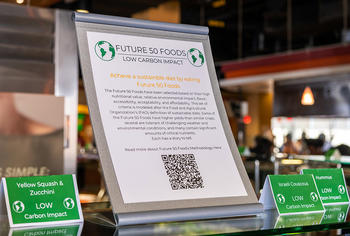
All food has a carbon impact, which reflects the amount of greenhouse gas emissions that are caused by creating that food, whether it’s from growing, transporting, processing, cooking, or disposal. Mason Dining was recognized with Food Management Magazine’s 2023 Best Concept Award – Best Station Concept for its Future 50 Foods program at Southside and Ike’s Dining Halls. The program helps diners track the carbon footprint of their food choices by color-coding them.
Mason’s newest dining hall, The Spot: Where Plants Power You, caters to the growing demand for plant-based dining options with an array of vegetarian and vegan dishes.
9. Grow your own food or help Mason grow some.
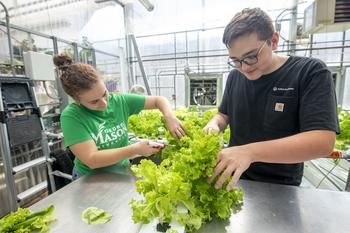
University Sustainability's Greenhouse and Gardens Program offers hands-on opportunities for you to get your hands dirty and learn about hydroponic and aquaponic food production systems while helping to plant and harvest fruits and vegetables. The Presidents Park Hydroponic Greenhouse produces almost 1,000 lbs. of fresh lettuce and salad greens annually that are served weekly at Ike's dining hall. The remaining herbs, fruits and veggies are donated to the community through Produce Pick-Ups, where anyone can sign up to receive free produce, as supplies last.
10. Volunteer.
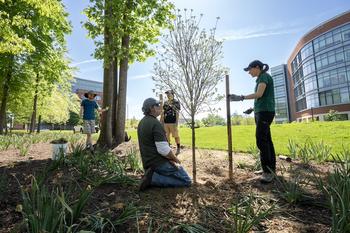
There are plenty of opportunities to volunteer on campus. Plant a tree, help with a composting audit, or assist Mason’s Food Recovery Network chapter with leftover food pickups from the dining halls, which is donated to those in need. Learn more.
Related News
- June 2, 2025
- May 30, 2025
- George Mason civil engineering students are helping local communities improve their flood resilienceMay 8, 2025
- May 1, 2025
- April 25, 2025
